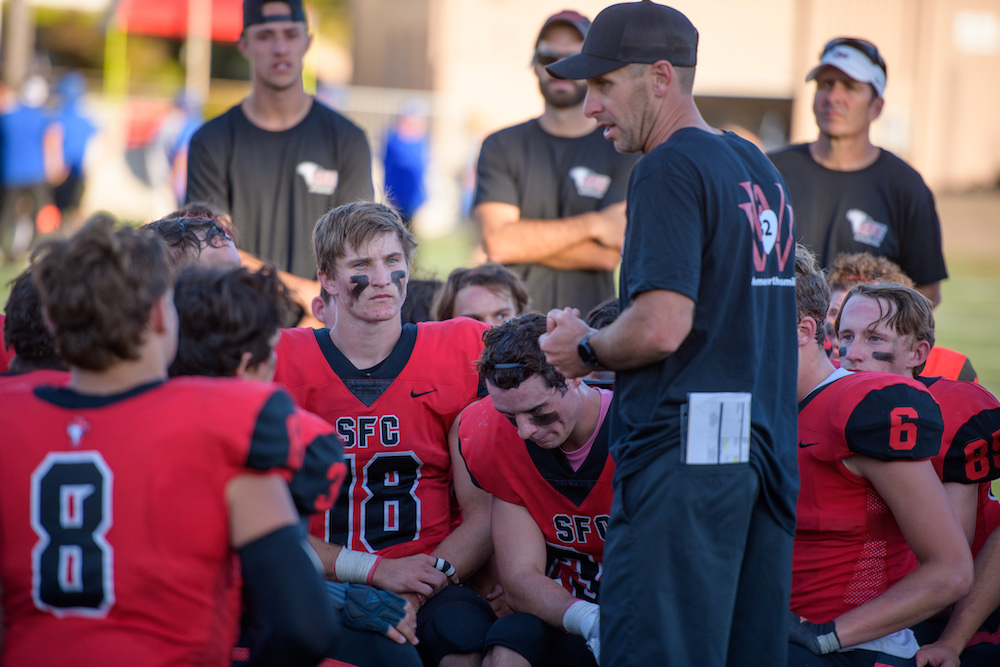To teacher Amy Kennard, “it’s not victory and failure, it’s a victorious fail.” SFC staff and teachers want students to experience a dynamic relationship with failure when it inevitably crosses their paths. Fostering a healthy approach to failure is a crucial part of SFC’s educational philosophy. “The misconception that we make is that failure is the opposite side of success. And it’s not. Failure is part of your success journey,” Doug Miller, Director of Athletics, emphasizes.
In all actuality, there is a clear interrelationship between success and failure. For Mike Siciliano, Dean of Students, confronting his own personal perspectives toward failure has impacted how he interacts with students academically and relationally. “I really started shifting the way I thought about failure,” he shares and now seeing it, “as the key to growth and success, as opposed to this thing that I have to be upset [about] when it happens.”
“If you look at any athlete that’s done anything significant or insignificant, failure is part of that,” Miller affirms. “It’s a mindset of embracing that (failure) is part of the process,” he continues. “I will fail. And I know our football team, and some of our other coaches profess this.” For many of the coaches, it’s not a matter of if the teams will experience failure, but how to advance after encountering failure.
Miller also sees failure as an opportunity for both individual and collective character development.
Athletic staff and coaches challenge athletes to take risks, acknowledging that failure is as much a part of the process as success. Miller wants students to try something new, embrace the struggles, and “figure out a way to move past that,” he says. In doing so, students lay a replicable foundation for success.
Adjusting Expectations and Redefining Success
Middle School Assistant Principal Kristi Ellis, whose children also attend SFC, recalls her oldest son’s first venture into the world of lacrosse. “He had never played lacrosse when he got here in high school. In North County, oftentimes, if you don’t start at age four and aren’t the superstar by your freshman year, you think you’re out.” The SFC community nudged him to “just give it a try.” “It’s a mentality here (at SFC),” Ellis asserts. “You can try this,” and ultimately, “he spread his wings. He had an incredible experience and stayed on the team for years.”
Adjusting expectations and resetting goals allows students to navigate failure, and the possibility of failure, in a safe and productive way. When expectations are too high, even the fear of failure obstructs students from stepping into their potential. To help reframe students’ expectations and motivations, Miller asks students questions like “wouldn’t it be fun to play lacrosse, and just have fun? Whether you win a title or not? Or are you here to win a title and get a scholarship?”
Addressing expectations opens the door for big-picture perspectives and redefines students’ definition of success.
“Flipping failure on its head,” Miller says, is a notion foreign to many students. SFC staff lead students in facing failure instead of avoiding it. Miller explains how he engaged with one high school student who battled shame and embarrassment after failing a couple of classes. “Now I get to say, ‘Hey, remember how you felt about that. And think about how differently you approach school now and the way you’ve totally restructured your life.”
If the student hadn’t confronted failure directly, “that probably wouldn’t have happened.” The student is now receiving A’s and B’s. Miller encouraged her that instead of simply receiving and accepting a C, failing empowered her to reshape her paradigm and entire approach to academics.
Creating a Safe Atmosphere for Failure
To help students fail victoriously, staff and teachers proactively come alongside students in moments of failure. Staff motivate both parents and other students to surround floundering students with positivity, spiritual, and moral support.
Mike Siciliano emphasizes the role of bolstering students. “I think the relationship piece is really at the center of so much of what happens here on campus,” he says. “Building that relationship intentionally before the point of failure is something that our teachers and coaches do really well.” Staff and teachers work to create a sense of trust so that “in that moment of failure, students will want to talk to staff about it. They’re going to want to share in that with you because they know you’re willing to share in that with them.”
As adults recalling “our own failures, we almost always see them as pivotal times for us. We don’t stay in the muck of the failure. We actually reach that point of being really grateful,” Ellis remarks. “It’s really hard when you’re a kid to get there. I don’t remember really feeling like I got there as a student,” Ellis admits. “But I had teachers and parents who coached me and promised me that this would be a stepping stone for me.”
To Ellis, the struggle is essential for “failing victoriously,” producing tenacity and strengthening resolve. “I see it in the Middle School all the time with the way our teachers come alongside kids when they’re struggling,” Ellis says. “We don’t want to bubble wrap our kids. And so the struggle is important.”
Students engage the discomfort of failure within a safe atmosphere. For Siciliano, cultivating trust involves relatability from teachers and coaches. “I think some of it is sharing personal stories. Students don’t have as much life experience. The thing they think they’re failing at feels like the most important thing they’ve ever done in their life,” he says. Young students can’t see the wealth of options and paths ahead and fear they won’t achieve their goals. “Having adults on campus who have the wisdom and experience to say to students, ‘Look, I had these failures, and this is what happened. This all worked out so differently than I thought, and thank God it did,’” Siciliano continues.
Biblical principles underlie the heart of failing victoriously. “God works all for the good of those that love Him and are called according to His purpose,” Romans 8:28 states. “That’s where our faith comes to bear,” Ellis reiterates. “We trust that what we are experiencing, “God is going to use in determining our course and strengthening us at the core.”
Let’s get to know each other. Fill out our kickoff questionnaire to learn more!








